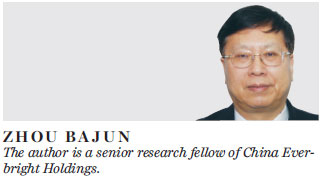'Localism' fails to acknowledge Hong Kong's economic realities
Updated: 2016-04-27 07:17
By Zhou Bajun(HK Edition)
|
|||||||||
The International Monetary Fund (IMF) published its global economic outlook on April 12. It raised its prediction on China's GDP growth for this year and next year, while lowering its expectations for the global growth rate during the same period. It also reiterated that China is very important to the global economy, predicting that GDP growth for the G20 as a whole will fall by 0.25 percentage points if China's GDP drops by one percentage point.
In the era of globalization, China plays a very important role in the global economy and mainstream opinion in the West accepts this reality - although the Census and Statistics Department of the SAR government has not used the IMF's method of calculation to see by how many percentage points Hong Kong's GDP rises or falls if the Chinese mainland's GDP gains or loses momentum. So there is no doubt Hong Kong's economy is more reliant on the mainland than any G20 member economy is. Ironically, some people in Hong Kong who believe in and advocate free-market capitalism still refuse to acknowledge this reality. Some even refuse to accept that Hong Kong must pursue economic integration with the mainland. They still insist it can exist independently without the mainland.
Lau Siu-lai, a sociology lecturer at the Hong Kong Community College, published an article in Ming Pao on April 8, in which she wrote the "new generation" of Hong Kong people who protested during the "umbrella revolution" will pursue a "free economy" which does not depend on the mainland economy. And she is not content with merely talking about it but wants to take action to achieve it - starting with seeking a Legislative Council seat in the elections in September. To do so, she has joined a political group called Hong Kong Lineup and will run for LegCo as a candidate.

A week later, political commentator Ching Cheong published a commentary in Ming Pao on April 15. He noted that the mass demonstration in 2010 against construction of an express rail link connecting Kowloon with the mainland's high-speed railway network "was the first manifestation of Hong Kong's localist sentiment". Although he stopped short of actually connecting the dots, Ching apparently saw the outburst of "localism" as a reaction to economic integration between Hong Kong and the mainland.
Some people may wonder why the mainstream Western view of the mainland's economy is now generally objective, whereas "localism" advocates in Hong Kong are not. This is odd considering the fact they have completely accepted the former's ideology and that their brand of "localism" is very much a Hong Kong version of Western bias toward the mainland. One reason for this is that Hong Kong was cut off from the mainland in the post-war era and the Hong Kong version of "localism" developed with a discriminatory streak.
This more or less separate existence encouraged some Hong Kong people to look down upon the mainland with an arbitrary sense of superiority. This sense of superiority persisted well after Hong Kong was badly hit by the Asian financial storm in the late 1990s, until the Chinese mainland became a World Trade Organization member economy in 2001. In the following years, the mainland became the hottest market for overseas investors, whereas Hong Kong struggled with the structural readjustment of its economy after its manufacturing industry moved to the mainland. As a result the sense of superiority of many Hong Kong people began to crumble.
So too did their belief that they had a higher standard of living. Some Hong Kong people may not realize that tens of millions of mainlanders still live in abject poverty. But they are well aware of the rapid rise of the middle class, especially in major cities and better developed coastal regions of the mainland. As the number of visitors from the north grew every year and the amount of money they spent on luxuries here rose, many locals began to feel lost and frustrated.
At this point I am reminded of a speech made by Lee Kuan Yew at a dinner on Oct 15, 1999 to celebrate the fourth anniversary of the Hong Kong Policy Research Institute. The late founder of the Republic of Singapore foresaw the sense of loss and frustration Hong Kong people would feel as they tried to get used to a new identity after 1997. Lee had already concluded then that the people of Hong Kong must accept and embrace the new reality. This is because things can never go back to the old days. In other words, integration with the mainland is inevitable and irreversible.
Hong Kong people must understand that Western ideology and values do not justify their sense of superiority over mainlanders. This has been used to justify discriminatory attitudes toward visitors from the mainland. It is in fact part of the "moral basis" of "localism", "de-Sinofication" and "Hong Kong independence". But it should now be discarded for good.
(HK Edition 04/27/2016 page1)